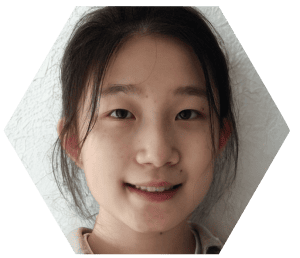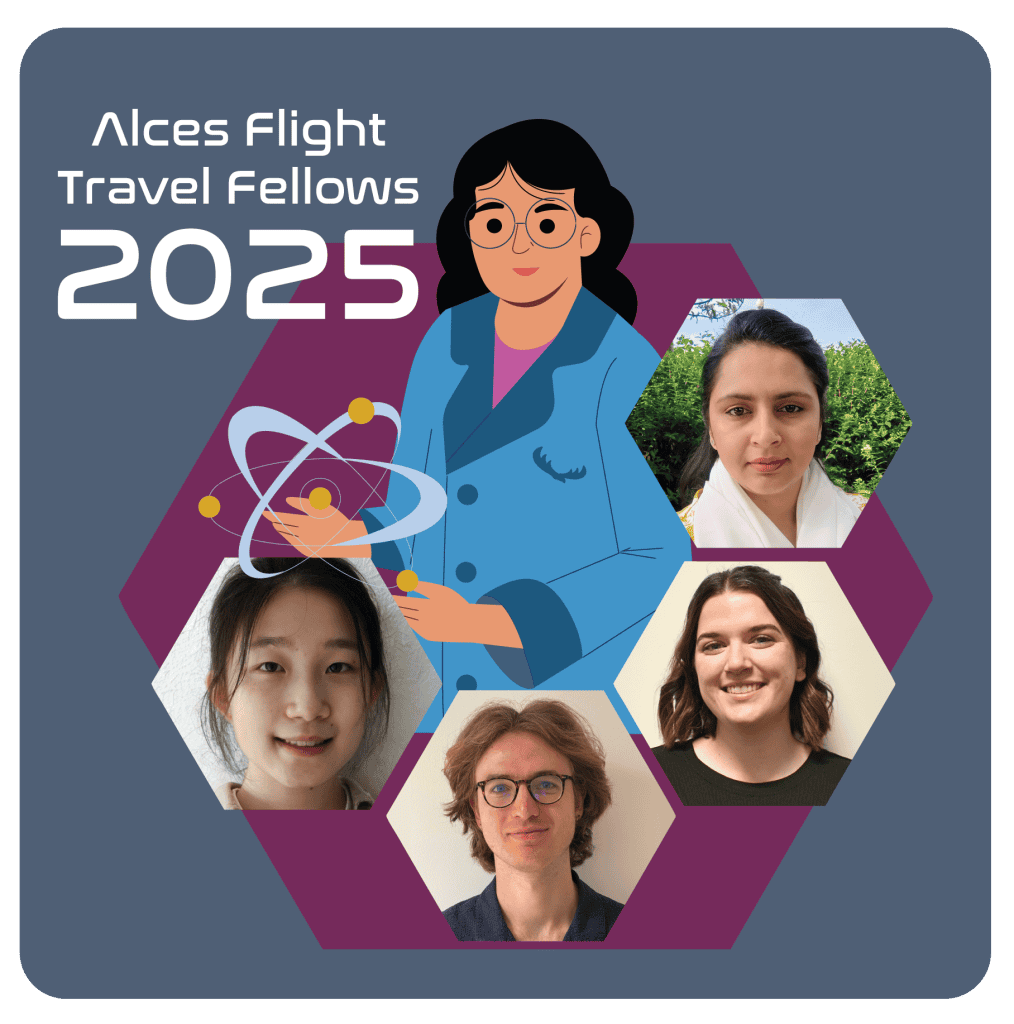We are honoured to present four rising stars in supercomputing as they prepare their presentations for our Sustainable Reality Event (SR25)
The team at Alces Flight are delighted to announce four recipients of the SR25 Flight Fellowship. This fellowship is an opportunity for UK-based students and those early in their career to travel and present their current research/industry focus at our event on October 7, 2025 at the RSC Library located in Burlington House. We were blown away by the applications received, and look forward to seeing them share their insights on stage and with our community.
Our honoured recipients are:
Urooj Ashger from TU Dublin
 Urooj is a PhD researcher at Technological University Dublin Ireland (TU Dubin), focusing on energy-efficient high-performance computing. She is a recipient of the prestigious Irish Research Council Postgraduate Award for her doctoral studies. Her research aims to reduce the energy consumption of computing systems, particularly for data-parallel workloads on modern HPC platforms. She has conducted experimental studies comparing hardware and software-based energy measurement tools using data-parallel kernels, as well as energy and performance benchmarking of machine learning algorithms. Her research goal is to contribute to greener and more efficient computing through accurate energy profiling, hybrid energy measurement strategies, and application-level optimisation.
Urooj is a PhD researcher at Technological University Dublin Ireland (TU Dubin), focusing on energy-efficient high-performance computing. She is a recipient of the prestigious Irish Research Council Postgraduate Award for her doctoral studies. Her research aims to reduce the energy consumption of computing systems, particularly for data-parallel workloads on modern HPC platforms. She has conducted experimental studies comparing hardware and software-based energy measurement tools using data-parallel kernels, as well as energy and performance benchmarking of machine learning algorithms. Her research goal is to contribute to greener and more efficient computing through accurate energy profiling, hybrid energy measurement strategies, and application-level optimisation.
She will be presenting, “Evaluating the Accuracy of Energy Measurement Tools for Data-Parallel Workloads in HPC Environment”
Abstract:
Energy consumption in computing presents significant environmental concerns, and its reduction has become a major technological challenge. The accurate measurement of energy consumption during application execution is essential for implementing effective application-level energy minimization techniques. In this work, we present an experimental comparative analysis that evaluates the accuracy of hardware and various software-based power measurement tools in measuring application energy consumption of CPU-based data-parallel workloads. We selected two data-parallel kernels, Matrix Multiplication and Fast Fourier Transform which are the building blocks of many scientific applications. These kernels were chosen for their computational intensity, memory-bound operations, and data parallelism, making them ideal benchmarks for energy-efficiency studies.
Our analysis focused on compute-intensive kernels operating across multiple processing units, where accurate energy measurement is critical for performance tuning and energy efficiency. We extend this empirical study to highlight the strengths and limitations of each software-based power-measurement tool. These results offer valuable insights into the accuracy of energy measurement tools for data-parallel workloads, particularly when relying on software tools. We also extend this study to compare the energy and performance characteristics of serial and parallel implementations of four machine-learning algorithms: K-means Clustering, Ant Colony Optimization, Logistic Regression, and Random Search. Our findings revealed a strong correlation between execution time and energy consumption, demonstrating that well-optimized parallel implementations can improve both performance and energy efficiency. Future work will expand the study to include GPU-accelerated workloads, hybrid energy measurement strategies, and communication-level profiling, with the goal of enabling energy optimization across these workloads.
Daniel (Danny) Ash from the University of Oxford
 Daniel (Danny) Ash is a first-year DPhil candidate at the University of Oxford, where he applies machine-learning techniques to monitor and predict biodiversity. Danny’s work fuses remote-sensing data, ecological field records and AI models to detect individuals within a species and understand the spatial dynamics across different species. Before returning to academia, Danny worked on R&D projects for methane-removal and anaerobic-digestion start-ups, using GIS data to find suitable locations. Originally trained as an astrophysicist, Danny completed a masters focussed on exoplanet detection. Across industry and research, Danny sought to use quantitative techniques to understand complex natural signals.
Daniel (Danny) Ash is a first-year DPhil candidate at the University of Oxford, where he applies machine-learning techniques to monitor and predict biodiversity. Danny’s work fuses remote-sensing data, ecological field records and AI models to detect individuals within a species and understand the spatial dynamics across different species. Before returning to academia, Danny worked on R&D projects for methane-removal and anaerobic-digestion start-ups, using GIS data to find suitable locations. Originally trained as an astrophysicist, Danny completed a masters focussed on exoplanet detection. Across industry and research, Danny sought to use quantitative techniques to understand complex natural signals.
He will be presenting, From “Pixels to Pedigree: Visual-Transformer based Re-Identification and Genetic Inference of Guppies”
Abstract:
Individual animal identification is crucial in ecological studies, particularly for mark–recapture and population monitoring. However, traditional tagging and genetic analyses are often invasive and costly. This project leverages recent advancements in vision transformers to develop a non-invasive approach to re-identify individual guppies (Poecilia reticulata) from Trinidadian streams. Utilising a dataset of over 500,000 images capturing over 30,000 individual guppies across their lifespan, we have fine-tuned DINO-V2 with self supervised and contrastive learning. Additionally, we explore the feasibility of inferring genetic relatedness solely from visual traits and assess the attention mechanisms to identify the most discriminating phenotypic markers, such as body shape and coloration.
Xinger Tang from the University of Edinburgh / EPCC
 Xinger Tang is an MSc student in High Performance Computing at EPCC, University of Edinburgh, with a strong mathematical foundation from an Honours Bachelor’s degree in Applied Mathematics. She also works as a research assistant at Highlander Lab, Roslin Institute, University of Edinburgh. Her interests lie in research software engineering, with hands-on experience in parallel computing, GPU acceleration, and scientific simulations gained through both coursework and collaborative projects. With a background bridging computer science and applied mathematics, Xinger is passionate about developing efficient, reliable tools for real-world research. Her current work includes implementing GPU versions of Lanczos methods with selective reorthogonalization and contributing to computational genetics projects in bioinformatics.
Xinger Tang is an MSc student in High Performance Computing at EPCC, University of Edinburgh, with a strong mathematical foundation from an Honours Bachelor’s degree in Applied Mathematics. She also works as a research assistant at Highlander Lab, Roslin Institute, University of Edinburgh. Her interests lie in research software engineering, with hands-on experience in parallel computing, GPU acceleration, and scientific simulations gained through both coursework and collaborative projects. With a background bridging computer science and applied mathematics, Xinger is passionate about developing efficient, reliable tools for real-world research. Her current work includes implementing GPU versions of Lanczos methods with selective reorthogonalization and contributing to computational genetics projects in bioinformatics.
She will be presenting, “Beyond Code: How the Underlying Math Shapes HPC Performance”
Abstract:
When we talk about high performance computing (HPC), the focus is often on hardware, parallelisation strategies, and programming techniques. However, the mathematical foundations of algorithms can have just as much impact on performance, sometimes in surprising ways.
A case in point is Singular Value Decomposition (SVD), widely used for dimensionality reduction in data preprocessing. In my colleagues’ work in computational genetics, SVD helps analyse population structures in animals. But standard SVD becomes prohibitively slow on large datasets. To address this, they explored randomised SVD (rSVD), which approximates the decomposition using a smaller, randomised subset of the data. While theoretically faster, they found rSVD could still underperform compared to certain full SVD implementations.
Digging deeper, I found the cause: the algorithmic choice. One implementation used the Householder method, while the faster one used the Lanczos method, an iterative algorithm better suited for large-scale sparse problems to find the major principal components of PCA.
This talk explores how interdisciplinary collaboration can reveal non-obvious bottlenecks and lead to better solutions, and highlights how understanding and choosing the right numerical methods can lead to unexpectedly large performance gains, often without touching the hardware. It’s a reminder that sustainability in HPC can also begin with smarter math.
Sarah Johnston from Durham University

Sarah Johnston is a third-year astronomy PhD student in the Institute for Computational Cosmology at Durham University. She holds an MPhys in Astrophysics from University of St Andrews and is passionate about engaging with HPC and harnessing the full power of modern computing in astronomy.
Her PhD centres around implementing a GPU offload in the SWIFT cosmology code, where she is currently developing the GPU port for gravity calculations. Having already demonstrated a proof of concept, she is currently working on optimisation and effective implementation within SWIFT’s task-based system. She also works separately on constraining mixed dark matter cosmologies using large-scale simulations.
Beyond her research Sarah is actively involved in outreach and skill development. She leads research groups for young people to get hands-on with coding and simulations and facilitates training for other researchers, helping them develop the computational expertise needed for modern astrophysics.
She will be presenting, “From GPU offloads for gravity in the SWIFT cosmology code”
Abstract:
GPUs can offer advantages in both sustainability and parallel processing capabilities compared to CPUs. However, many large astronomy codes are CPU-based, so have to be redesigned to be GPU compatible. This can be through total rewrite or through partial offloading of key sections to GPU. SWIFT is a versatile, open-source astronomy code used for a range of research areas including galaxy formation, planetary science, and cosmology. A significant portion of SWIFT’s runtime is dedicated to gravity calculations. In gravity n-body codes, each particle (representing a celestial object) interacts with every other particle via gravitational forces, making the calculations computationally intensive. However, the repetitive and non-interdependent nature of these interactions makes them ideal candidates for GPU acceleration.
In this work, I build on the existing SWIFT code by replacing specific CPU-based gravity calculation functions with new GPU kernels. This creates a new hybrid C and CUDA version of the code which transfers gravity calculations to the GPU, freeing up the CPU to carry out the other tasks.
Our GPU-accelerated gravity kernels achieve high accuracy, with less than 1% deviation from CPU results below the Nyquist frequency. We also successfully produce nearly identical final particle distributions to the CPU-only implementation. Furthermore, the utilisation of GPUs allows for a redistribution of the gravity calculations meaning more interactions can be carried out using direct particle-particle summations which are more accurate. This improves both the scientific results and the environmental footprint of the code.
About the Alces Flight Fellowships
As part of our ongoing commitment to supporting the next generation of supercomputing leadership, the Alces Flight Crew created four pre-paid travel fellowships for Sustainable Reality (SR25), taking place on October 7th in London, UK. These fellowships were designed for UK-based students and early career professionals working in or studying the field of supercomputing.
Each recipient will receive mentorship on their presentation, as well as pre-paid travel to attend and present at SR25. We are truly grateful for the enthusiasm and quality of applications received, and we remain committed to creating opportunities for those entering and transitioning into the fields of HPC and AI.


